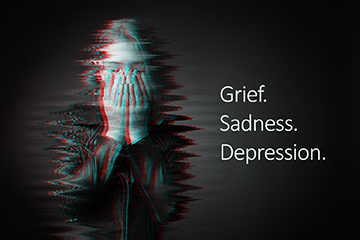Everyone feels sad from time to time. It’s a natural response to difficult experiences, disappointments, or loss. But when does sadness cross the line into something more serious, like depression? Understanding the difference is crucial for recognizing when you or someone you love may need support.
What Is Sadness?
Sadness is a temporary emotional state that arises in response to a specific event, such as the loss of a loved one, a breakup, or a failed opportunity. It’s a normal and healthy emotion that allows us to process difficult experiences.
Signs of Sadness:
- Triggered by a specific event or situation
- Typically temporary, lasting hours to a few days
- Still able to enjoy moments of happiness
- Does not significantly interfere with daily life
- Improves with time or positive distractions
Sadness can feel overwhelming, but it usually fades as circumstances change or as we find ways to cope.
What Is Depression?
Depression, on the other hand, is a mental health condition that extends far beyond temporary sadness. It affects thoughts, emotions, and behaviors, often without a clear cause. Depression can persist for weeks, months, or even years and significantly impact daily life.
Signs of Depression:
- Persistent sadness or emptiness lasting more than two weeks
- Loss of interest in activities once enjoyed
- Changes in sleep patterns (insomnia or excessive sleep)
- Appetite changes (eating too much or too little)
- Feelings of hopelessness, guilt, or worthlessness
- Fatigue and low energy, even with adequate rest
- Difficulty concentrating or making decisions
- Physical symptoms like headaches or unexplained pain
- Suicidal thoughts or self-harm tendencies
Depression is not just a reaction to a bad day or a rough patch—it’s a serious condition that requires attention and, often, professional support.
How to Tell the Difference
The key distinction between sadness and depression lies in duration, severity, and impact on daily life. Sadness is usually short-lived and linked to a specific event, while depression lingers and affects multiple aspects of a person’s well-being.
| Feature | Sadness | Depression |
|---|---|---|
| Duration | Temporary, fades with time | Persistent, lasting weeks or months |
| Cause | Triggered by a specific event | May not have a clear cause |
| Effect on Life | Still able to function and find joy | Significant disruption in daily activities |
| Mood Changes | Improves with time or positive events | Constant or worsening feelings of despair |
| Physical Symptoms | Usually none | Fatigue, appetite changes, sleep disturbances |
When to Seek Help
If you or someone you know is experiencing symptoms of depression, seeking professional help is important. Therapy, medication, and lifestyle changes can all be effective in treating depression.
Signs You Should Reach Out for Help:
- Symptoms last more than two weeks
- Struggles with daily responsibilities and relationships
- Loss of interest in life
- Feelings of hopelessness or thoughts of self-harm
How to Support Someone with Depression
If a friend or loved one is showing signs of depression:
- Listen without judgment – Let them express their feelings.
- Encourage professional help – Suggest therapy or a doctor’s visit.
- Check in regularly – Small gestures can mean a lot.
- Be patient – Recovery takes time.
Final Thoughts
Sadness is a normal part of life, but depression is a serious condition that should not be ignored. If you’re unsure whether you’re dealing with sadness or depression, pay attention to the duration, intensity, and impact on daily life. Seeking help is a sign of strength, not weakness, and the right support can make all the difference.
If you or someone you know is struggling with depression, don’t hesitate to reach out to a trusted friend, family member, or mental health professional. You are not alone, and help is available.




